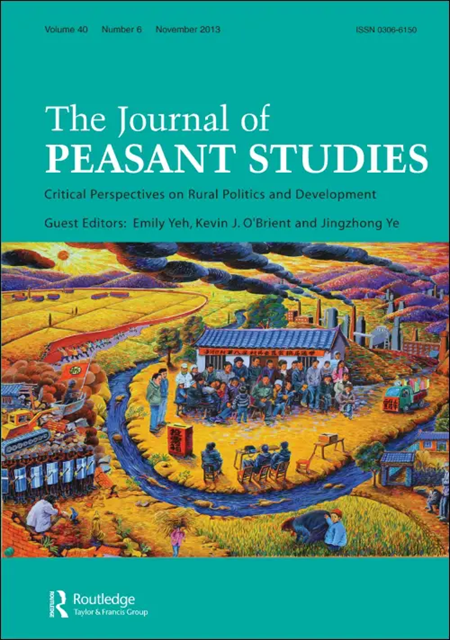做饭、吃饭、男人、女人:了解马拉维粮食安全和营养新联盟、营养主义及其替代品
IF 4.8
1区 社会学
Q1 ANTHROPOLOGY
引用次数: 63
摘要
八国集团(G8)发起了新的粮食安全和营养联盟,通过私营部门参与农业发展来改善营养结果。马拉维加入该联盟揭示了干预背后的假设。我们表明,虽然新联盟似乎与营养没有什么关系,但它作为粮食和农业私有化框架的出现已经酝酿了几十年,最好被理解为营养主义项目的结果。为了突出这一方法的缺陷,我们介绍马拉维北部土壤、粮食和健康社区倡议的调查结果,该倡议通过结合生态农业耕作做法、社区动员、赋予妇女权力和改变家庭内部性别动态,成功地解决了营养不良问题。将新联盟的政治经济分析与土壤、粮食和健康社区倡议的政治经济分析进行对比,可以看出对营养不良的性别社会背景的关注与营养主义之间的区别。最后,我们分析了营养在不利于或有利于自由的干预中发挥作用的方式。本文章由计算机程序翻译,如有差异,请以英文原文为准。
Cook, eat, man, woman: understanding the New Alliance for Food Security and Nutrition, nutritionism and its alternatives from Malawi
The Group of Eight Countries (G8) launched the New Alliance for Food Security and Nutrition to improve nutritional outcomes through private sector involvement in agricultural development. The accession of Malawi to the Alliance reveals the assumptions behind the intervention. We show that while the New Alliance may seem to have little to do with nutrition, its emergence as a frame for the privatization of food and agriculture has been decades in the making, and is best understood as an outcome of a project of nutritionism. To highlight the failings of the approach, we present findings from the Soils, Food and Healthy Communities Initiative in northern Malawi, which has demonstrated success in combatting malnutrition through a combination of agroecological farming practices, community mobilization, women's empowerment and changes in intrahousehold gender dynamics. Contrasting a political economic analysis of the New Alliance alongside that of the Soils, Food and Healthy Communities Initiative shows the difference between a concern with the gendered social context of malnutrition, and nutritionism. We conclude with an analysis of the ways that nutrition can play a part in interventions that are inimical, or conducive, to freedom.
求助全文
通过发布文献求助,成功后即可免费获取论文全文。
去求助
来源期刊

Journal of Peasant Studies
Multiple-
CiteScore
10.50
自引率
17.60%
发文量
99
期刊介绍:
A leading journal in the field of rural politics and development, The Journal of Peasant Studies (JPS) provokes and promotes critical thinking about social structures, institutions, actors and processes of change in and in relation to the rural world. It fosters inquiry into how agrarian power relations between classes and other social groups are created, understood, contested and transformed. JPS pays special attention to questions of ‘agency’ of marginalized groups in agrarian societies, particularly their autonomy and capacity to interpret – and change – their conditions.
 求助内容:
求助内容: 应助结果提醒方式:
应助结果提醒方式:


